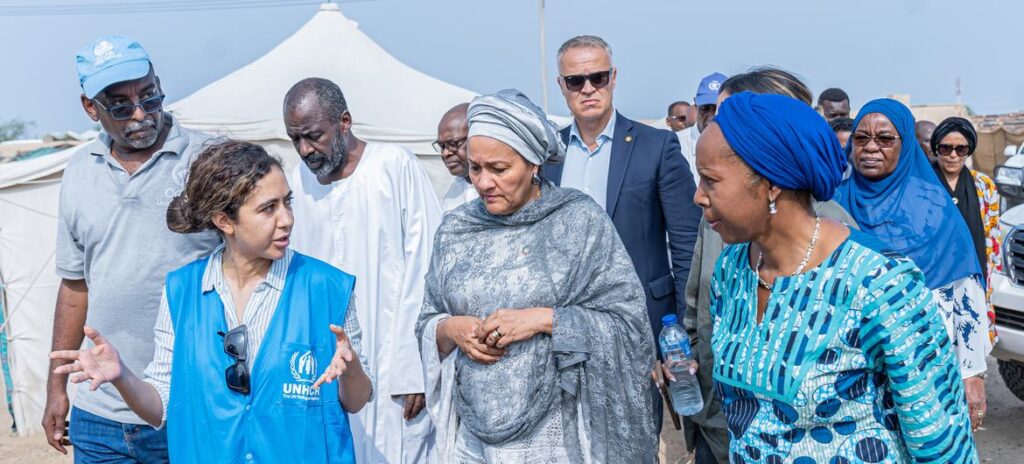Chad is home to more than 1.1 million refugees, many of whom are fleeing violence in Sudan, where rival armies have been fighting since April 2023. At the same time, the war has also caused enormous suffering within Sudan’s borders.
“The humanitarian task we have in Sudan has been enormous,” said the UN Deputy Secretary-General Amina Mohammedsaid. “It is a matter of consistently supporting the government to address the crisis. The suffering of the people in this country is one of the worst crises in the world today.”

© UNICEF/Aymen Alfadil
Since June, hundreds of thousands of people in Sudan have been affected by heavy rainfall and flooding.
Ms Mohammed met officials in Chad and announced a $5 million allocation from the UN Central Emergency Fund (CERF) as part of a rapid response in support flood recovery UN spokesman Stéphane Dujarric told reporters at UN headquarters on Friday.
Region in crisis
Chad and neighboring Sudan are grappling with multiple crises, including the ongoing Sudanese war and recent flooding that 960,000 people in Chad And 310,000 in Sudanaccording to UN agencies.
The talks between the deputy UN chief and local authorities in Chad focused on the complex challenges facing the country, including regional dynamics and key risks, and emphasized “the urgent need for global solidarity,” the UN spokesman said.
Ms Mohammed reaffirmed the UN’s commitment and called for “maximum solidarity and resources” to ensure the humanitarian response fulfils its mandate and supports the people of the region. She urged parties to “invest more in saving lives and livelihoods”.
‘Indispensable lifeline for emergency services’
While in Chad, Ms. Mohammed observed the humanitarian corridor operation at the recently opened Adré transition point to Sudan and spoke with refugee representatives, women, youth and community leaders, who welcomed the recent opening as “a positive step” toward providing life-saving aid in Sudan.
“This border crossing is a vital lifeline for the delivery of aid to millions of people in Sudan and must remain open and accessible to enable large-scale humanitarian assistance while ensuring the safety of aid workers,” the UN spokesman said.
This humanitarian corridor will be closed for a year and will allow UN agencies to scale up aid to 14 areas facing famine in Darfur, Kordofan, Khartoum and Al Jazirah.

United Nations/Daniel Getachew
UN Deputy Secretary-General Amina Mohammed (right) visits Adré, Chad, at the border crossing with Sudan.
‘We need resources now’
The deputy UN chief stressed the importance of keeping the crossing open permanently.
The Adré crossing is the most effective and shortest route to bring humanitarian aid to Sudan – and in particular to the Darfur region – at the scale and speed needed to respond to the immense famine.
“What we need to do is align the openings of these borders with the aid that comes in, and that means resources,” she insisted, “and so we need those resources, and we need them now.”
The UN appeal of $2.7 billion is only 41 percent funded.
Sudan: War, displacement and hunger
Across the border in Sudan, food safety experts are investigating recently stated that led to the war parts of North Darfur is in faminespecial the Zamzam campwhere more than half a million displaced people have found shelter.
Some 25.6 million people – more than half of Sudan’s population – are facing acute hunger, including more than 755,000 people on the brink of famine and an estimated 10.7 million people are now internally displaced, according to UN agencies.
When Ms Mohammed visited Sudan earlier this week, she met the country’s president and cabinet members, who agreed that the Jeddah peace process must be implemented quickly. She stressed that “there is consensus and there is no reason why it cannot continue.”
However, the discussion largely focused on the humanitarian agenda and “the urgency of this,” she told reporters at a news conference in Port Sudan on Thursday.
She said efforts were being made to address the legitimate concerns of the Sudanese government and to put in place procedures that “ensure this assistance reaches the people where it is intended.”

© UNICEF/Satti
UN Deputy Secretary-General Amina Mohammed visits the UNICEF-supported e-learning centre for displaced people in Abdullah Naji, Port Sudan.
‘Famine crisis’
“We have a looming famine crisis,” Ms. Mohammed said. “We are not getting medical supplies where there are health crises. But more importantly, we must not forget the suffering of the people, and we are here to do that with the government of Sudan.”
Mrs Mohammed met displaced people, the UN team and with a number of government officials.
“What we did was sit down with the Humanitarian Aid Committee, and then we had discussions about how we can first of all not stop the aid that is available now,” she explained.







